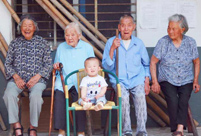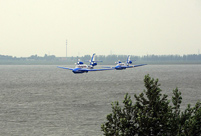 Happy life in Xinjiang
Happy life in Xinjiang
 2014 China Hainan Int'l Automotive Exhibition kicks off
2014 China Hainan Int'l Automotive Exhibition kicks off
 Collection of 'China Dream' public-spirited ads
Collection of 'China Dream' public-spirited ads
 The silent holy stones
The silent holy stones
 University students take care of giant pandas
University students take care of giant pandas
 Leading lady a true legend
Leading lady a true legend
 China Pan-Asia Stone Expo held in Kunming
China Pan-Asia Stone Expo held in Kunming
 Taiwan woman marries into Kazak family, 100 sheep plus a flat as dowry
Taiwan woman marries into Kazak family, 100 sheep plus a flat as dowry
 College girls take graduation photos under water in Chongqing
College girls take graduation photos under water in Chongqing
 Cartoon: Xi and football
Cartoon: Xi and football
Creating textile jobs
Inside Ruisheng's workshop, few workers could be found on the production lines.
"We prefer machines to people," said a line manager who did not give his name. "People's salaries increase every year, but machine [expenses]won't."
Ruisheng, with an annual production capacity of 70,000 spindles of cotton yarn, only employs around 280 workers, with many of them recruited from neighboring Gansu Province. The workers' salary is around 3,000 yuan per month, according to Xu.
"Cities such as Aksu and Korla in southern Xinjiang are also major textile bases that need workers, so local Uyghur people do not like to travel far away from home and work here," Xu said, noting that there is only one Uyghur couple working in the factory.
The central government is counting on the textile industry to create jobs especially in southern Xinjiang where more than 80 percent of the population is Uyghur people, as part of the strategy to maintain local stability. It plans to invest 10 billion yuan in the textile industry in the autonomous region, according to information from the region's commerce work conference held in mid-January in 2014.
A plan released by the Economic and Information Commission of Xinjiang in September 2013 also aims to raise the local textile industry's employment capacity to 1 million people by 2020 from 200,000 in 2012.
Shandong Ruyi Group plans to invest 20 billion yuan in building a textile production base in Kashi, known as Kashgar in the West, the company announced in June. The first phase of the project is expected to be put into operation within two years and to recruit 26,000 workers.
Several Zhejiang-based textile firms including Youngor Group and Zhejiang Giant Eagle Group also plan to expand their investment in southern Xinjiang cities such as Aksu and Alar.
Mei Xinyu, a research fellow at the Chinese Academy of International Trade and Economic Cooperation, is not optimistic about the new round of the"Go west" campaign for textile mills.
"Similar moves in the 1990s and 2006 led to huge losses for textile mills," he said in a Weibo post on June 8, citing high cotton prices and poor labor quality in Xinjiang.
There are concerns that staff management will be a major challenge for non-local companies.
"It will increase enterprises' operational cost to recruit Uyghur people, as factories need to deploy mentors for those who do not speak Putonghua," a staff member with the administrative committee of Shihezi's economic and technological development zone told the Global Times on condition of anonymity. "Some Uyghur youth are also not accustomed to the tight schedules of factory work."
The increasing number of textile mills is Xinjiang has also raised worries about the protection of the local fragile environment.
"The textile industry is a major contributor to water pollution, so facilities to deal with industrial waste should be built together with textile mills," Tang Lijiu, head of Xinjiang West-East Economic Research Institute, told the Global Times in late June.
 |
 How Chinese men kill the time when their wives practice square dancing?
How Chinese men kill the time when their wives practice square dancing? Chinese Navy frogmen in training: photos
Chinese Navy frogmen in training: photos Lishui, city of longevity with 186 healthy men above 100 years old
Lishui, city of longevity with 186 healthy men above 100 years old Hong Kong Fashion Festival kicks off
Hong Kong Fashion Festival kicks off Germany crush Brazil to advance to World Cup final
Germany crush Brazil to advance to World Cup final Danish badminton team plays Chinese social media users on Asia tour
Danish badminton team plays Chinese social media users on Asia tour Art on eggshells
Art on eggshells Test flight of Russian amphibian BE-103 in Shenyang, NE China
Test flight of Russian amphibian BE-103 in Shenyang, NE China Stewardesses of CHR trains experience walk with white cane
Stewardesses of CHR trains experience walk with white cane Picturesque Bashang Prairie through lens
Picturesque Bashang Prairie through lens 'Finding Nemo' in Seattle Aquarium
'Finding Nemo' in Seattle Aquarium 28 old villages in Hunan under preservation
28 old villages in Hunan under preservation Anti-terrorism drills held in Luliang, Shanxi province
Anti-terrorism drills held in Luliang, Shanxi province Hot weather drives citizens to play mahjong in water
Hot weather drives citizens to play mahjong in water Largest domestic UAV exhibition held in Beijing
Largest domestic UAV exhibition held in BeijingDay|Week|Month